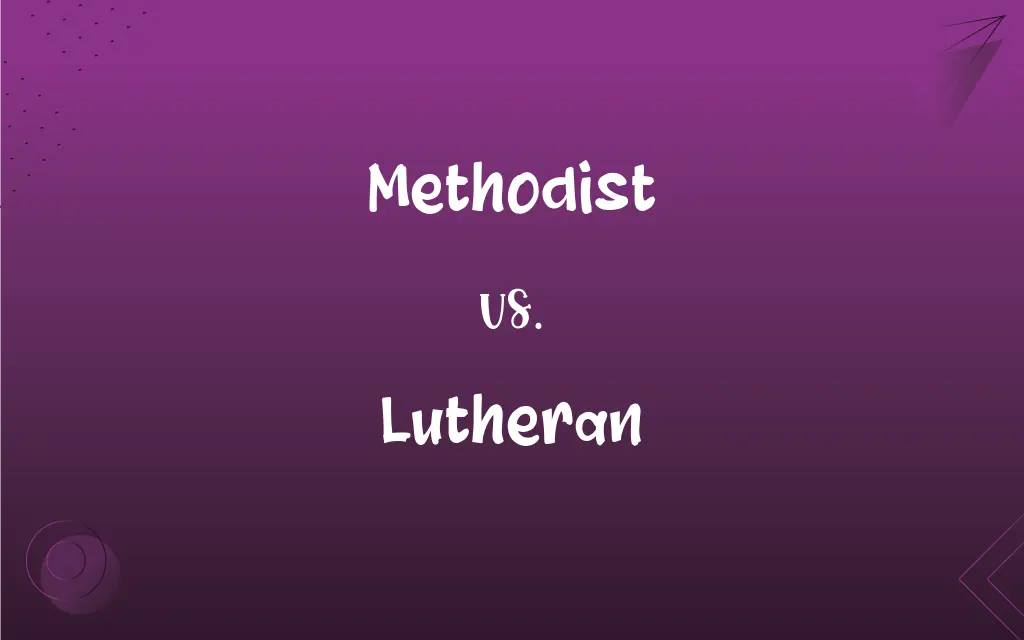Methodist vs. Lutheran: What's the Difference?
Edited by Janet White || By Harlon Moss || Published on January 15, 2024
Methodist emphasizes personal faith and community service, deriving from John Wesley's teachings; Lutheran focuses on justification by faith alone, based on Martin Luther's Reformation principles.

Key Differences
Methodism, initiated by John Wesley in the 18th century, is known for its strong emphasis on personal holiness and social justice. Lutheranism, founded by Martin Luther in the 16th century, centers on the doctrine of justification by faith alone, a key principle of the Protestant Reformation. Both denominations are branches of Protestant Christianity, but they differ significantly in their doctrinal emphases and religious practices.
In Methodism, there is a notable emphasis on personal spiritual experience and a commitment to social causes. This contrasts with Lutheranism, which places greater emphasis on traditional liturgy and sacramental practices. Methodists often engage in lively worship and are known for their evangelical outreach, whereas Lutherans typically maintain a more formal liturgical worship style, deeply rooted in the historical traditions of the church.
Methodist theology is characterized by the concept of sanctification, or growing in personal holiness, as a lifelong process. In contrast, Lutheran theology strongly upholds the doctrine of sola fide, meaning salvation is achieved through faith alone, not by works. This theological difference reflects their distinct approaches to Christian life and practice.
The governance structure also differs; Methodism usually has a more decentralized organization with a strong emphasis on the role of laity, while Lutheran churches often have a more hierarchical structure, with significant authority vested in clergy and bishops. These organizational differences reflect their unique historical contexts and theological foundations.
Methodism's roots in the Anglican tradition influence its liturgy and ecclesiology, while Lutheranism, born from the heart of the Reformation, retains many elements of Roman Catholicism, reformed under Lutheran doctrine. Both denominations contribute uniquely to the diverse tapestry of Protestant Christianity, each with its own rich traditions and theological perspectives.
ADVERTISEMENT
Comparison Chart
Founder
John Wesley
Martin Luther
Key Doctrine
Sanctification and personal holiness
Justification by faith alone
Worship Style
Lively, evangelical, and often informal
Traditional, liturgical, and formal
Social Engagement
Strong focus on social justice and outreach
Emphasis on traditional community service
Theological Emphasis
Personal spiritual experience and growth
Adherence to scriptural and doctrinal authority
ADVERTISEMENT
Methodist and Lutheran Definitions
Methodist
A member of a Protestant Christian denomination founded on the principles of John Wesley.
She's a devout Methodist who attends church every Sunday.
Lutheran
Someone who upholds the principles of the Reformation as interpreted by Luther.
As a Lutheran, she values the historical significance of the 95 Theses.
Methodist
Reflecting the Methodist emphasis on evangelism and missionary work.
Her Methodist beliefs inspire her to volunteer for international missions.
Lutheran
Characteristic of the Lutheran Church, especially in liturgical practice and theological belief.
They enjoy the rich Lutheran traditions observed during Christmas.
Methodist
Someone who follows the Methodist doctrine, emphasizing personal faith and social service.
As a Methodist, he actively participates in community outreach programs.
Lutheran
A follower of the Christian denomination that adheres to the teachings of Martin Luther.
He's a Lutheran pastor known for his insightful sermons.
Methodist
Pertaining to the Methodist Church and its teachings or practices.
They held a Methodist wedding ceremony at their local church.
Lutheran
Pertaining to the community and culture of the Lutheran Church.
Their wedding blended traditional Lutheran customs with modern elements.
Methodist
Characterized by the application of Wesley's methodical approach to Christian life and worship.
His methodist approach to prayer involves daily devotion and scripture reading.
Lutheran
Relating to Lutheranism, a branch of Protestant Christianity focusing on justification by faith.
Their Lutheran faith shapes their understanding of grace and salvation.
Methodist
A member of an evangelical Protestant church founded on the principles of John and Charles Wesley in England in the early 1700s and characterized by active concern with social welfare and public morals.
Lutheran
Of or relating to the religious doctrines of Martin Luther, especially the doctrine of justification by faith alone.
Methodist
Methodist One who emphasizes or insists on systematic procedure.
Lutheran
Of or relating to the Protestant denomination adhering to these doctrines.
Methodist
One who follows a method.
Lutheran
A member of the Lutheran Church.
Methodist
(history of science) One who limits the domain of science to that which can be investigated using the scientific method.
Lutheran
Of or pertaining to Luther; adhering to the doctrines of Luther or the Lutheran Church.
Methodist
Alternative form of Methodist.
Lutheran
One who accepts or adheres to the doctrines of Luther or the Lutheran Church.
Methodist
One who observes method.
Lutheran
Follower of Lutheranism
Methodist
One of an ancient school of physicians who rejected observation and founded their practice on reasoning and theory.
Lutheran
Of or pertaining to Martin Luther or his teachings;
The Lutheran doctrine of justification by faith alone
Methodist
One of a sect of Christians, the outgrowth of a small association called the "Holy Club," formed at Oxford University, a. d. 1729, of which the most conspicuous members were John Wesley and his brother Charles Wesley; - originally so called from the methodical strictness of members of the club in all religious duties.
Lutheran
Of or pertaining to or characteristic of the branch of the Protestant Church adhering to the views of Luther;
Lutheran doctrines
Methodist
A person of strict piety; one who lives in the exact observance of religious duties; - sometimes so called in contempt or ridicule.
Methodist
Of or pertaining to the sect of Methodists; as, Methodist hymns; a Methodist elder.
Methodist
A follower of Wesleyanism as practiced by the Methodist Church
Methodist
Of or pertaining to or characteristic of the branch of Protestantism adhering to the views of Wesley;
Methodist theology
FAQs
How does Lutheran worship style compare to Methodist?
Lutheran worship is traditionally liturgical, whereas Methodist worship can be more informal and varied.
What is the origin of Methodism?
Methodism originated in the 18th century through the work of John Wesley.
What is a key belief of Lutheranism?
Lutheranism emphasizes justification by faith alone.
What role does personal experience play in Methodism?
Personal spiritual experience is central in Methodism.
How do Methodist and Lutheran views on sacraments differ?
Methodists have an open table for communion, while Lutherans have a more traditional view on sacraments.
Do Lutherans have a specific catechism?
Yes, Lutherans use Luther's Small Catechism for teaching.
How does Lutheran theology interpret the Bible?
Lutherans interpret the Bible through the lens of sola scriptura, meaning "scripture alone."
Can Methodists trace their roots to the Anglican Church?
Yes, Methodism evolved from the Anglican tradition.
What is the Methodist approach to social issues?
Methodists actively engage in social justice and outreach programs.
Are Methodist services liturgical?
Methodist services can be both liturgical and non-liturgical, depending on the congregation.
Is social activism a part of Methodist beliefs?
Yes, social activism is a significant aspect of Methodist practice.
What distinguishes Lutheran baptism?
Lutherans practice infant baptism, emphasizing it as a means of grace.
Do Lutherans believe in predestination?
Lutherans generally adhere to a doctrine of single predestination, focusing on God's role in salvation.
What is the Methodist Church's stance on ecumenism?
The Methodist Church actively participates in ecumenical efforts.
How do Lutherans view other Christian denominations?
Lutherans typically respect other denominations, focusing on shared beliefs in Christ.
What role do laypeople play in the Methodist Church?
Laypeople play a significant role in Methodist church leadership and decision-making.
Do Lutherans have a formal confession of faith?
Yes, Lutherans adhere to the Augsburg Confession as a key statement of faith.
How do Methodists and Lutherans approach missionary work?
Both denominations engage in missionary work, but Methodists are particularly known for their evangelical outreach.
How does Methodist governance work?
Methodism typically features a decentralized governance with conferences and local church autonomy.
Are there different branches within Lutheranism?
Yes, there are several branches, including the ELCA and Missouri Synod in the U.S.
About Author
Written by
Harlon MossHarlon is a seasoned quality moderator and accomplished content writer for Difference Wiki. An alumnus of the prestigious University of California, he earned his degree in Computer Science. Leveraging his academic background, Harlon brings a meticulous and informed perspective to his work, ensuring content accuracy and excellence.
Edited by
Janet WhiteJanet White has been an esteemed writer and blogger for Difference Wiki. Holding a Master's degree in Science and Medical Journalism from the prestigious Boston University, she has consistently demonstrated her expertise and passion for her field. When she's not immersed in her work, Janet relishes her time exercising, delving into a good book, and cherishing moments with friends and family.






































































